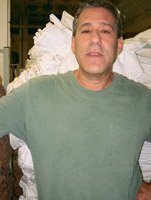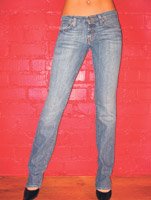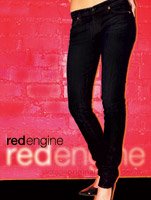Basic Instinct
While other denim brands opt for novelty, Red Engine sticks with the basics
A few decades from now, jeans from failed denim lines of the early 21st century may be highly collectible. But Red Engine won’t be one of them.
That’s because the L.A.-based premium-denim line has modeled itself more on the timeless style of Levi’s than the ephemeral embellishments of any current season. Founded six years ago by Jim Boldes, a former senior vice president of operations at Guess who’s also worked stints at Mossimo and Tommy Hilfiger, Red Engine scrupulously emphasizes fit and quality over fleeting fashion trends. The formula has worked. Sold in Bloomingdale’s and 600 specialty boutiques nationwide, the line has grown steadily and consistently to around $15 million in annual sales—all the while being made entirely in Los Angeles.
The California Apparel News sat down with Boldes and discussed Red Engine’s success and the future of the premium-denim market.
CAN: What’s your take on the denim bubble bursting?JB: I think it’s going to be good for me, because a lot of people have jumped on denim as a trend even though it’s not what they really do. They don’t ship and [they] have fit and production problems. I know there’ll be a shakeout, and those people are going to fall out. I’m very basic and have a loyal customer base, so I think in the end it’s going to be good for me.
CAN: With so many brands out there, what’s the key to winning customer loyalty?JB: Quality of the product. A lot of people sold $150–$200 jeans and the quality just wasn’t that good. Fit is the number-one thing, and last year we were voted best-fitting jean by Lucky, Glamour and Real Simple. We have a really good following because people love our fit. People who buy trend jeans wash them a few times and realize it’s not that great a product, especially stretch jeans.
I buy the most expensive denim I can basically find on the market, really good denim, mostly from Italy and a little from Japan. So people realize when they wash Red Engine a few times that the product gets better. I want to be a basic-jean line that will be around for a long time, so I want my jeans to look better when you wash them.
CAN: Many denim brands are the “it” jean for one season, then quickly lose their popularity. How do you avoid that?JB: By being consistent and being true to ourselves. A lot of brands like Antik Denim make a very good product. Antik became a big item because it had embroidery all over the back pocket. I’m more basic, and people always buy basic jeans. Even though I might throw some fashion in the line, the real part of my line is a very basic jean. The fabric and washes change, but the fit doesn’t really change that often. People don’t buy my jeans because they have gold and silver and trinkets and embroidery. A lot of brands come into the market and hit a trend, but that trend could last three, six or nine months, but not five years. CAN: What did you learn at Guess and Tommy Hilfiger that you were able to apply in the premium-denim market?JB: The consistency of the product I ship is very good. Everything looks and fits the same. I learned a lot of technical stuff at Guess that keeps the product very consistent so you know what you’re getting when you buy Red Engine. The other thing I learned was to plan your business correctly and ship. When you’re in a basic market, people want to be able to reorder. I know a lot of people that have jumped on premium denim as a trend don’t have stock and can’t ship right away. One of our biggest strengths is that you can order Red Engine, sell out, and one or two weeks later get a reorder. On our core product, we can ship right away. CAN: And what have you learned about the premium-denim market that you can only learn by diving into it?JB: People who aren’t shipping realize that it’s a lot harder than making T-shirts. People who’ve jumped into it with no experience realize it takes some experience to do it correctly. It’s not like ordering knits or T-shirts from China and then printing on them. You’ve got to cut, sew, and wash the right way, and people doing it as a trend probably have fit and all kinds of other problems. CAN: What do you do to ensure that you ship regularly?JB: Because people come to me for specific items, I just keep them in stock. If you’re a new startup trying to find your way in the market, you can’t really hold inventory, so it’s hard your first year or two because you don’t know what people are going to end up coming to you for. My first couple of years it was hard to figure out, too. But after six years of doing this, we easily ship over 90 percent because we know what people are going to order tomorrow. CAN: What about ensuring quality?JB: I buy from the best mills in the world—I’d rather not say who. Still, every single lot is tested before I cut it. When I go to the laundry, I make sure that the shades are matched before we put thousands in the machine. And we do shrink tests: If the fabric doesn’t shrink the same, I know the fit will be off and I won’t cut it. CAN: Why the decision to have your jeans manufactured in Los Angeles?JB: I want a made-in-America jean, not made in Mexico or China. I believe we [California] invented jeans, [and] Levi’s made them famous.
I’d rather know that the quality is under my nose and not 10,000 miles away somewhere. I’m very actively involved in production, and that’s why you see consistency with Red Engine. I can walk to my sewing and drive to my laundry in five minutes, and I’m there all the time. CAN: What about cost-effectiveness?JB: I get e-mails every day to make goods in India, Pakistan, China, Mexico. I could make things cheaper, but in the end if the product doesn’t sell because it doesn’t look good, then what am I doing?CAN: How much cheaper would it be to go overseas for roughly the same quality?JB: I’m sure I could do half the price, no question. CAN: And what are your price points?JB: My wholesale is generally $70, retail $150. CAN: So you’re less expensive than brands that sell for $190, yet you say your quality is better and more consistent. JB: I know there are lines making $200 jeans that buy cheaper fabric and don’t put as much money into washing as I do. I run a profitable business and operate a very small, tight ship. CAN: Many premium-denim brands have been built by deliberately not marketing. Why is that necessary for premium denim, and what kinds of marketing do you do?JB: It’s word of mouth. We keep growing because the product is good. We get enough PR through magazines and editors wearing our product. CAN: And that’s what the consumer wants. Once there’s a big splash in a magazine, it’s not really cool anymore, is it? Part of the mystique of a denim brand is discovering it yourself. JB: Exactly, and that’s why I do what I do. A lot of people try to put them on celebrities. But I think people are sick of wanting something because a celebrity is wearing it—you know, “I really don’t care what Jessica Simpson is wearing today, I want to wear what looks good on me.” The best PR I ever got was Jessica Simpson had our jeans on in five different magazines on the newsstand. But that’s not how I want to build the company. I want to build it as a word-of-mouth, cooler, below-the-surface line. I don’t want to be the trend jean that people buy this month, then next month go, “Oh, Jessica Simpson isn’t wearing it anymore.”
I didn’t shoot up like a Seven or True Religion from 0 to $50 million in a second, but year after year I have continued growth. CAN: As a percentage, how have you grown over the years, and when was your biggest surge?JB: The last three years was our biggest surge. We doubled one year, then went up 70 percent last year. CAN: So you’re in the $20 million range for gross sales?JB: Not quite, but getting closer. CAN: So 15-ish?JB: Yeah. CAN: Some denim brands are diversifying their lines to keep up sales. Do you plan to do the same?JB: The bigger jeans companies are trying to make themselves into a lifestyle brand, and I don’t feel I’m big enough or even want to do that right now. I really want to sell my jeans, I don’t want to do a knit line and call it Red Engine. I want to add market in denim; I want people to buy more of what I’m making, not just make up numbers with wovens or knits. CAN: But how do you get someone to buy basics when they already have 20 pairs of jeans?JB: The first couple of years it was really hard, because people said, “I don’t want another basic jean.” But once people got them in their stores and saw how good they were, the growth has been steady. And it’s real growth. It took a while, but people do want my basic jean now.CAN: Is there a segment of the market that’s most important for you?JB: Because we’re so basic, we’re across the board. I’m not making a juniors jean and I’m not making an old lady’s jean. I have a skinny jean on the market now; it’s definitely younger. People in Manhattan who didn’t order our jeans before are ordering them now because of our skinny, and I know it’s going to a younger customer. CAN: What are your newest products?JB: The skinny and straight leg, like probably every other denim company. The boot cut is still our biggest seller.CAN: So, you do have to follow silhouette trends?JB: Absolutely. If people are buying skinnier jeans, then I have to do a skinnier jean. But I’m not drastically changing the Red Engine fit just because I did a straight leg. I’ve revamped men’s, and we’re going to have two really cool new fits. I did men’s and it was successful, but I kind of put it on the back burner. Now people want more, so we’re bringing out more stuff for fall. CAN: Who designs the line?JB: My wife and I; she was a designer at Guess. She does the fashion details and I do the technical stuff.
When we have meetings, I have to remind my wife and our sales team that we’re a basic line. Salespeople like to scream, “I can sell a ton of this today,” and I go, “Yeah, but we’re a basic jean line and we’ve got to stay true to what we do.” Embroidered pockets are big, and I never did them. I’m glad I didn’t. A lot of store owners come to me and say, “This is what I’m selling, why don’t you do this?” And I go, “You should buy it from so-and-so because they do a better job. If Antik has the best embroidered pockets, go buy it from them.” They do a great job, so let them have that market. CAN: What other denim brands do you admire?JB: True Religion did a very funky version of a basic jean and I think they did a great job. Jerome at Citizens of Humanity does a great job. And Rock & Republic did a great job with marketing. And Seven for All Mankind is still going strong.
























